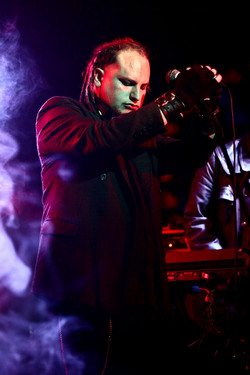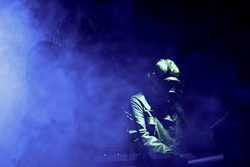
May 23rd, 2014 | E-mail interview by
NINa | Submit for
an interview |
professional review | Read other
Fabryka interviews

 NINa: They say that the Aztec people lived in balance with nature and themselves, so they had time to be creative. Do you think the current human civilization has any healthy balance left between creation and destruction, so there's still some space for making truly original art?
Bryan Tabuteau (programming, synths):
NINa: They say that the Aztec people lived in balance with nature and themselves, so they had time to be creative. Do you think the current human civilization has any healthy balance left between creation and destruction, so there's still some space for making truly original art?
Bryan Tabuteau (programming, synths): I think it’s very hard to generalize about human civilization, but I feel that modern societies afford people a great deal more ‘leisure’ time, which in my mind is essential to creating art that breaks out of traditional patterns. I don’t think we have any healthy balance between creation and destruction in modern western societies (this may not hold true for others), and in general I think the collision of cultures, ideas and people happening around us is essential for making original art. We’re all pretty misanthropic, and I don’t think we hold out much hope for the future of civilization, but I think some amazing art will be made amid the destruction.
NINa: You seem to like reaching out into the very core of things, then mixing and shaking them up. Does the use of technology alter the organic sound of guitars, voice and drums to the point of a better understanding through dissonances?
Bryan: I think that is quite true for us, yes. In the end it’s all about the feeling you’re trying to express and communicate to the listener. With Crash-Scan we’re obviously using semi-traditional ‘song’ forms, but to do that and create unsettling or oppressive feelings involve manipulation and subversion of known elements. Modern technology allows us to do that a lot more drastically than older tape and sampler manipulation methods, but we’re still trying to keep within relatable forms for this band. We love recontextualizing sounds and field recordings, putting things together that don’t fit and trying to make something we like out of it.
 NINa: Is it very difficult to achieve the same sound effects and therefore atmosphere when you play these songs live, compared to how they sound on Repeat Until False?
NINa: Is it very difficult to achieve the same sound effects and therefore atmosphere when you play these songs live, compared to how they sound on Repeat Until False?
Bryan: Yeah, it’s hard to pull off everything live, there’s less manipulation you can do in that context, but I think our live show just has a slightly different vibe. The subtleties get lost, so a little bit of the atmosphere, but you hopefully end up with a bit more power, aggression and you can use the volume and noise to create a more oppressive overwhelming vibe. Live we’re currently Bass, Guitar, Vocals and I do Samples, Synths, Vocoder and backup Guitar. The vast majority of effect and noise elements in the recorded tracks are there live, triggered through my sample pads or synth patches. The new album has a few elements that we’ve had to put in the drum/percussion track, we just don’t have enough people on stage to do everything for this album, which was a conscious decision when we were recording it. The songs off our first album
Catalyst were a bit less complicated sound wise, and we could play all of that between the 4 of us. We didn’t want to restrict
Repeat Until False to the things we could pull off live though, it felt too limiting.
SoundCloud |
ReverbNation |
Facebook |
Last.FM
Buy on:
Crash-Scan store |
Bandcamp |
iTunes |
Amazon
Pictures (C) James Peryer. Questions proofreading: Mike 'Vesper' Dziewoński.

 May 23rd, 2014 | E-mail interview by NINa | Submit for an interview | professional review | Read other Fabryka interviews
May 23rd, 2014 | E-mail interview by NINa | Submit for an interview | professional review | Read other Fabryka interviews

 HOME
HOME All reviews
All reviews Short music reviews part 1
Short music reviews part 1 Short music reviews part 2
Short music reviews part 2 All interviews
All interviews Short movie reviews
Short movie reviews Testimonials
Testimonials About Fabryka Magazine
About Fabryka Magazine What's industrial rock?
What's industrial rock? Quick encyclopedia
Quick encyclopedia Industrial manifestos pdf
Industrial manifestos pdf Podcast archives
Podcast archives News archives by year
News archives by year Article archives by year
Article archives by year All article archives
All article archives Legal music
Legal music Fabryka promo events
Fabryka promo events Staff
Staff





 Reviews and interviews:
Reviews and interviews: